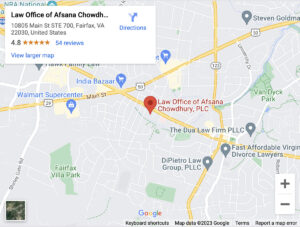Afsana Chowdury | January 31, 2024 | Family Law

Divorce and family law cases often involve sensitive information and emotional issues. Many spouses feel uncomfortable sharing this information, even with a Fairfax divorce lawyer. However, attorney-client privilege can help ease your mind if you are concerned about sharing sensitive or confidential information with a lawyer.
What Does Attorney-Client Privilege Mean?
Overall, privilege refers to the protection of specific information that cannot be disclosed to others without the consent of those involved. Privileged information and evidence are not subject to discovery in a legal case. That means, in part, that a person cannot be compelled by the court to testify about privileged information.
There are several types of privilege that a person may exert. Examples of privilege include:
- Privilege against self-incrimination under the Fifth Amendment to the U.S. Constitution
- Attorney-client privilege prevents attorneys from disclosing information a client tells them in confidence
- Husband-wife privilege that prevents a spouse from disclosing confidential communications between a husband and wife
There are exceptions to privilege in specific situations. For example, husband-wife privilege might not always apply when the spouses are adverse parties in a court case, such as a divorce.
When Does Attorney-Client Privilege Apply in a Virginia Divorce Case?
When you disclose confidential information to a Fairfax divorce attorney, generally speaking, that information is protected by attorney-client privilege. Your attorney cannot disclose the information without your consent unless an exception applies (see below for details). A judge usually cannot force a lawyer to testify about privileged information or disclose the information during discovery.
Generally, attorney-client privilege applies when you create an attorney-client relationship by meeting the following four criteria:
- Information is disclosed between a lawyer and a client;
- The purpose of disclosing the information is for the person to obtain legal advice from an attorney;
- The person had a reasonable expectation that the information disclosed to the attorney would remain confidential and private; and,
- The lawyer acted within their professional capacity during the meeting with the client.
You must expect that your conversation with a divorce attorney is private for privilege to apply. Therefore, if you ask an attorney at a dinner party about the grounds for divorce in Virginia, the communication is unlikely to be privileged because other parties could hear your conversation.
Is an Initial Consultation With a Fairfax Divorce Lawyer Covered by Attorney-Client Privilege?
Some people may question whether free consultations with divorce attorneys in Virginia are protected by attorney-client privilege. Until the person retains the lawyer, the person is not a client. However, you can argue that meeting with an attorney can meet each of the four requirements for attorney-client privilege to attach to the conversation.
If you are anxious about disclosing information during an initial consultation with a divorce lawyer, discuss confidentiality and privilege before disclosing information with the attorney. The attorney can offer additional information about attorney-client privilege during your consultation.
Are There Exceptions to Attorney-Client Privilege in a Virginia Divorce Case?
Yes. There are exceptions to attorney-client privilege that could require an attorney to disclose information in a legal matter. Examples of situations where an attorney might be required to tell the court or other parties information disclosed by a client include:
- A client or potential client asks a lawyer for advice or information about committing fraud or other criminal offense
- A client dies, and individuals with a right to the estate pursue a lawsuit regarding the person’s probate estate
- An attorney represents both parties, and the parties decide to sue each other about an issue related to the joint representation
- A law enforcement agency has probable cause to suspect that communications between an attorney and inmate are being used to conceal terrorist activity
There could be other circumstances and situations that might void the attorney-client privilege. A portion of a conversation or some information might not be privileged, but all other communication between the attorney and client remains privileged.
What Do You Need To Tell Your Fairfax Divorce Lawyer About Your Marriage?
An attorney cannot provide effective representation without all relevant information. A reason for attorney-client privilege is to encourage clients to be open and honest with their attorneys. Clients can disclose all information related to their case without fear that the information will be disclosed in court or to the public, including details that would apply to:
- Grounds for the divorce
- Child support and child custody
- Spousal support or alimony
- Domestic violence
- Property division
If an attorney lacks information, it can negatively impact the outcome of the case. The last place an attorney needs to discover information about their client or the case is in the courtroom or a deposition. If the attorney has the information beforehand, they can take steps or develop a strategy for minimizing adverse effects.
Don’t be afraid to disclose all information to your Fairfax divorce attorney. The more information you provide your attorney, the better they can protect your best interests throughout your divorce case.
Contact The Divorce Law Firm of Chowdhury Divorce Law Group in Fairfax, VA
For more information, please contact an experienced divorce lawyer at Chowdhury Divorce Law Group to schedule an initial consultation today. Our law office is located in Fairfax, VA.
We proudly serve in Fairfax County and its surrounding areas:
Chowdhury Divorce Law Group
10805 Main St STE 700A
Fairfax, VA 22030
(703) 271-6519
Our firm is located near you. We have an office in Fairfax
Find us with our GeoCoordinates: 38.8497929, -77.3185772,3047

About The Author

Afsana Chowdhury is the founder of Chowdhury Divorce Law Group, where she is dedicated to protecting the rights of injury victims across Virginia. A George Mason University School of Law graduate, Afsana is licensed to practice in Virginia and has devoted her legal career to personal injury law. She focuses on helping clients, guiding them through divorce, custody disputes, and other complex family matters. With years of experience and a deep commitment to protecting her clients’ rights, she personally handles each case to ensure strong, focused representation.
Location: Fairfax, VA


